 |
 |
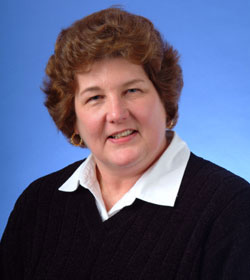
|
|
Robin L. Meckley, M.L.S., Instructional Resources Librarian, Scientific Library, National Cancer Institute at Frederick, Frederick, Maryland
|
1. I chose this career because...
2. My typical workday involves...
3. What I like best/least about my work...
4. My career goals are...
5. When I'm not working, I like to...
6. Words to live by...
|
|
1. I chose this career because...
|
Back to Top

|

|
|
A colletion of Robin Meckley's favorite childhood books.
|
I chose to become a librarian because I have always been an enthusiastic reader, and from an early age, enjoyed spending time in libraries. In the 7th grade, I was a member of the Library Club. Club members helped the busy school librarian return books to their proper shelves. This early experience gave me a taste of the career I would come to love.
In college, I earned a Bachelor of Science degree with a double major in English and library science. With this degree, I could teach secondary school English or be a school librarian. During my college years, I also worked part-time in my small town public library, where I learned how to do a lot of basic library tasks. After graduation, I took a position as a children’s librarian at a county public library. I enjoyed this job very much, and learned a great deal.
Work, Family, and Continuing Education
I then took a very long break from employment when I started a family. When I decided to return to work, I found that most librarian positions required a master’s degree in library science (MLS). Since I didn’t have an MLS degree, I was fortunate to find a support position in a local library. This time the work had a very specialized focus because it was a scientific research library.
While working in this support position, I decided to return to school to earn an MLS degree. Happily, I found that my employer offered tuition reimbursement, so most of my college fees were covered. It took me 3 years to earn the MLS degree. During this time, I attended a class where I experienced an “aha!” moment. In the class, I learned how to use electronic bibliographic databases to search for scientific articles published in professional journals. I realized that I no longer wanted to be a school or public librarian. Instead, I wanted to specialize as a medical or scientific librarian.
Learning On-the-Job
Although having a science background helps, it is not essential for becoming a medical librarian. I was able to learn a lot about science and medicine in practical, on-the-job situations, an effective type of learning that continues today.
Variations on a Theme
It is also important to know that there are different types of jobs for medical librarians. I work in a scientific research library, helping researchers who work in basic science. Other medical librarians work in clinical settings such as hospitals or medical schools, helping physicians, nurses, and even patients. Still other medical librarians work at biotechnology or drug companies. For greater job flexibility, I recommend pursuing a Master of Library Science degree from a program that is approved by the American Library Association (ALA).
Education
- Bachelor of Science, English and Library Science, Shippensburg College (now Shippensburg University), Shippensburg, PA
- Master of Library Science, University of Maryland, College Park, MD
|
|
2. My typical workday involves...
|
Back to Top

|
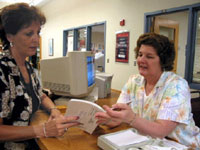
|
|
Robin Meckley working at the reference desk in the Scientific Library, National Cancer Institute at Frederick
|
My typical workday is from 8:30 a.m. – 5:00 p.m., Monday through Friday. I work every 6th Saturday as well.
My primary duties are to:
- Provide training and education opportunities – As a team leader for the library’s training committee, I organize and facilitate training and educational opportunities for the scientists, researchers, and the library staff. I am also the primary teacher for our hands-on classes that are held in the library’s microcomputer lab. We offer classes in medical and scientific database searching, such as PubMed and Web of Knowledge, as well as, classes in management software, such as EndNote and Reference Manager. Knowledge of these programs, computer searching, and how to use the Internet is vital. Knowledge of computer software such as Microsoft Word and PowerPoint is also valuable when organizing and preparing classes.
- Perform searches - As the primary bibliographic database searcher, I perform most of the searches requested by our scientists. I also organize and facilitate a Current Awareness service. In this role, I perform bibliographic database searches to compile the most up-to-date information about requested topics. Scientists often request this service and use the information to aid in their own research. Extensive knowledge of bibliographic databases is a must for performing these duties.
- Create and update Web site pages - I create and update a number of pages on the library’s Web site, including anything connected to training, such as Web tutorials. Web tutorials are designed to teach the same concepts and skills that are learned in our hands-on classes, but in a virtual environment available to anyone with Internet access. I update most of these tutorials as often as possible. Knowledge of web coding and relevant software is very valuable in this situation.
- Provide customer service - As a member of the reference team, I work regularly scheduled hours at the reference desk. During these hours, I must be prepared to answer customers’ questions in a prompt and professional manner. “People” skills are very important in this aspect of my job, as well as knowledge of the library’s print and electronic collections. Computer savvy is helpful here too, as I may have to demonstrate to customers how to save a file, or use the scanner.
- Promote library services - As part of a team, I participate in the library’s promotional activities at facility-wide functions, such as open houses, research festivals, and programs geared to children. These activities provide the staff an opportunity to be creative and to have fun while promoting the library and its services. Working as part of a team requires good interpersonal skills.
|
|
3. What I like best/least about my work...
|
Back to Top

|
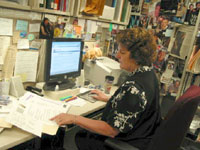
|
|
Robin Meckley working at her desk.
|
What I like best about my work is the diversity of tasks I perform. The variety keeps me from getting bored with any one duty.
What I like least about my work is the stress that results from having too many duties that must be completed at the same time.
|
|
4. My career goals are...
|
Back to Top

|
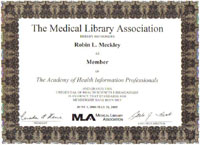
|
|
Robin Meckley's Medical Library Association Academy of Health Information Professionals membership certificate
|
My career goals are to stay up-to date and to promote the career of medical librarianship.
Libraries, and the librarians who staff them, must change and adapt to serve the users in as many ways as possible. It is very important, then, for me to stay on top of new services, programs, and activities in the library field. Reading the professional literature, attending professional meetings, and participating in training sessions are helpful in attaining this goal. Computer skills have become mandatory in my work, so staying up-to-date on the evolving technology and software is vital.
I also want to help promote medical librarianship as a career, which is the reason that I am participating in LifeWorks. I want people to know that being a medical librarian is an extremely interesting and rewarding profession.
Achieving My Goal
I attained a personal goal in 2000 when I became a member of the Academy of Health Information Professionals (AHIP). AHIP is the Medical Library Association’s peer-reviewed professional development and career recognition program. The academy recognizes the personal investment of time and effort required for exemplary professional performance, and for contributions to the association and to the profession. Although my employer does not require membership, I wanted to become a member for my own personal satisfaction. Now I plan to maintain my membership by reapplying every 5 years.
|
|
5. When I'm not working, I like to...
|
Back to Top

|
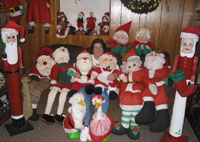
|
|
Robin Meckley's Santa collection
|
When I’m not working, I still love to read, especially fiction. I particularly enjoy reading a book and then watching the movie based on that book. I also enjoy watching movies of almost any kind, especially those starring Harrison Ford. Now that our sons are adults, my husband and I can travel more frequently, as long as we can find someone to watch over our menagerie of pets - 2 friendly golden retrievers and 2 moody cats. For many years, I have been collecting Mr. and Mrs. Santa Claus figures. My collection now numbers close to 350 sets.
|
|
6. Words to live by...
|
Back to Top

|
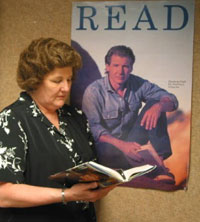
|
|
| |
Robin Meckley with a poster of her favorite actor, Harrison Ford, who shares her love of reading.
|
“The health sciences librarian believes that knowledge is the sine qua non of informed decisions in health care, education, and research and the health sciences librarian serves society, clients, and the institution, by working to ensure that informed decisions can be made.” From the Medical Library Association’s Code of Ethics for Health Sciences Librarianship.
|
|
|
|
 |